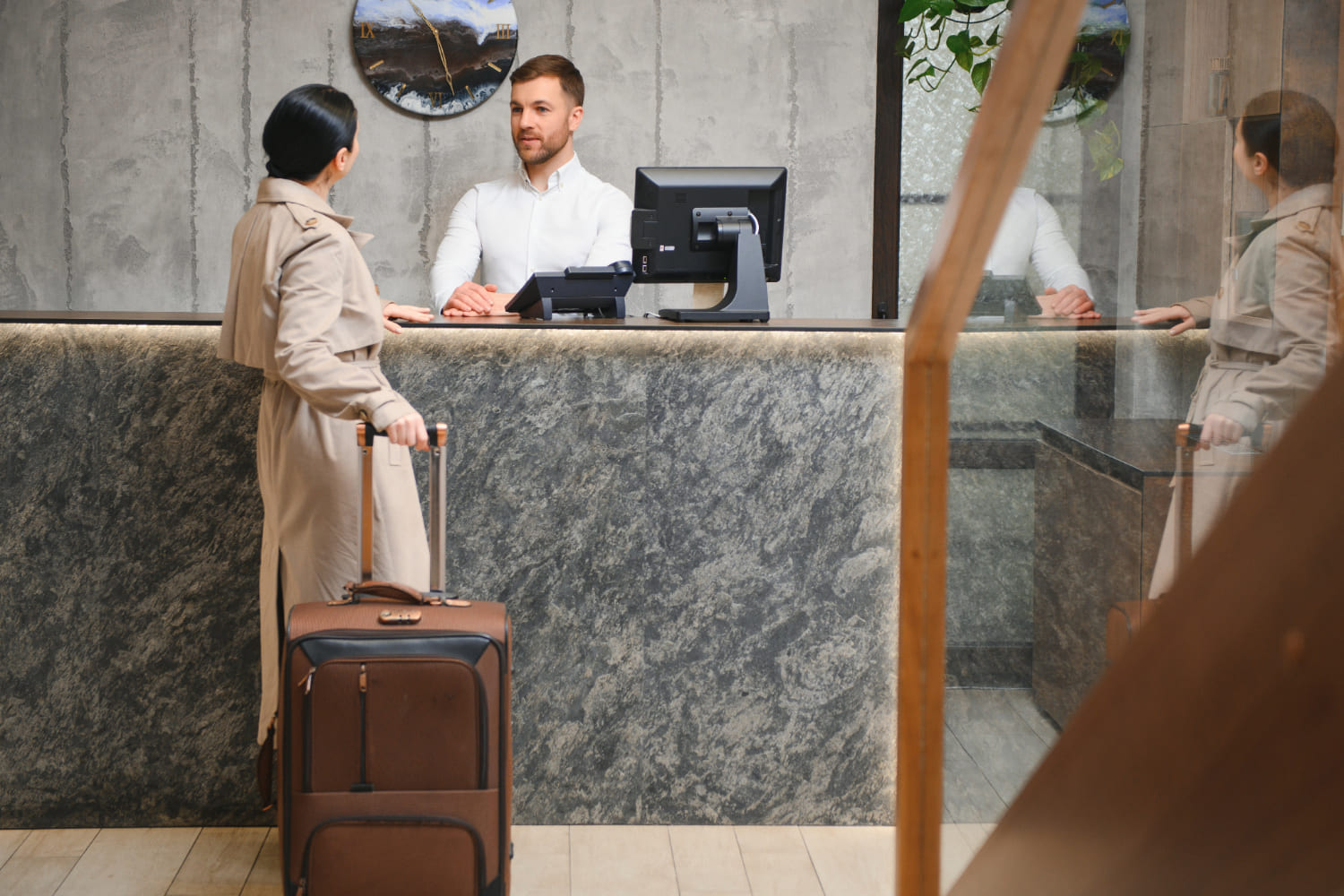The abandonment rate in the financial industry can be reduced — but only by addressing the underlying causes and redesigning digital experiences with real user needs in mind.
Digitalising hotel check-in: burden or opportunity?

The Spanish hospitality sector closed 2024 with record-breaking figures: over 363 million overnight stays (+4.9% compared to 2023), contributing 13.4% to national GDP, and a sharp increase in digital transformation—particularly among small and medium-sized tourism businesses, where digitalisation rose by 50% in just one year (INE, Exceltur, SEGITTUR). This growth raises an unavoidable question: are internal processes, such as guest registration, keeping pace with this new digital reality?
Identity verification in hotels: a legal process… stuck in the past
H
otels in Spain are legally required to register and identify all guests staying overnight on their premises and report this data to the police via official forms. This procedure—regulated by Organic Law 4/2015 on the Protection of Public Safety, along with regional tourism rules and Ministry of the Interior instructions—entails a series of administrative steps that directly impact daily hotel operations:
- Guest personal data must be collected with precision, with identity verified in advance.
- The information must be immediately recorded and digitally communicated in real time from an approved platform.
- The entire process must comply with the General Data Protection Regulation (GDPR), limiting the collection and retention of unnecessary data.
- Not only hotels, but also hostels, guesthouses, campsites, tour operators and digital accommodation platforms must comply with this law.
Check-in bottlenecks: why the system breaks down
In practice, this system places a significant burden on reception staff, who often manually enter guest data, visually verify identity documents, and ensure timely compliance. This traditional approach is not only time-consuming but also introduces multiple points of failure:
- Human errors in data transcription.
- Lack of traceability in meeting legal obligations.
- Guest frustration due to long waiting times.
- Inflexibility during peak seasons or group check-ins.
A legally required process, yes—but one that urgently needs to be digitised, automated and secured for both guest satisfaction and operational resilience. The key lies in turning this obligation into an opportunity to enhance the guest experience, strengthen the hotel’s brand, and safeguard legal compliance.
The solution: a simple, adaptable proposal with GuestID
TrustCloud has anticipated these operational challenges and designed a solution that is agile, secure and compliant with legal requirements to fully digitalise and automate the guest check-in process. It works whether the hotel already uses a management platform or has no system in place.
Smart identity verification
GuestID uses advanced technology to digitise identity documents and verify their authenticity in real time:
- Advanced OCR scanning: Extracts key document data (name, ID number, nationality, issue date, etc.) in a structured format, eliminating human transcription errors.
- Authenticity check: Confirms the document is valid, current and untampered.
- Biometric analysis: Automatically compares the document image with a live selfie using FaceMatch technology to ensure the guest matches the ID. This is key to preventing identity fraud and reassuring both hotel and guest.
The solution adapts to different levels of hotel digitalisation, with two main use cases:
- Hotels with an existing management system
- For hotels with a check-in or PMS already in place, TrustCloud integrates seamlessly via APIs or SDKs.
- Frictionless integration: Works with the existing system without disrupting operational flows.
- Full automation: Verified guest data is entered into the software and official forms are generated and sent to the authorities.
- Compliance ensured: Identity checks and document validation are performed from within the hotel’s own system.
What’s automated:
- Guest data capture.
- Official reporting forms.
- Identity verification, without modifying hotel workflows.
- Hotels without an existing application
- For properties without digital tools, TrustCloud provides a complete standalone solution:
- Ready-to-use application: A simple interface accessible via web browser by hotel staff—no app downloads needed.
- NFC verification: Enables reading chip data from the ID or passport, avoiding even the need to process document photos—greatly reducing data sensitivity.
- Official form generation: Automatically produces the data report for authorities.
- Multilingual interface for ease of use.
Benefits beyond compliance
TrustCloud’s proposal delivers concrete advantages, from legal and operational to technological:
- Guaranteed legal compliance: Aligned with Organic Law 4/2015, GDPR and local police reporting requirements—eliminating regulatory risk.
- Under 30-second check-in: Scan, verify and register guests in seconds, whether individually or in groups.
- Reduced human error: Automated data capture avoids transcription mistakes, missing information or duplication.
- Flexible integration: Works with existing systems or independently—no costly system overhauls.
- Data privacy and security: Minimises sensitive data processing (e.g. no facial image retention), upholding GDPR’s data minimisation principle.
- Modern brand image: TrustCloud GuestID technology helps hotels build a reputation for safety and forward-thinking service from the very first guest interaction—the check-in—enhancing how the service is perceived ove
Empowering compliance, efficiency and trust from the front desk
In a sector where guest experience is everything and regulations are growing stricter, automating check-in is more than an operational upgrade—it’s a strategic advantage. TrustCloud GuestID transforms legal obligation into business opportunity: legal compliance, time optimisation and a seamless first contact—all in one secure platform.
























